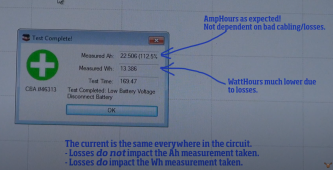About 1 year ago I had 4x 280K cells form SFK and I built a battery it tested to 278.1 AH and 3601 WH with the 150 AMP bms (same as jbd). So is this a pass or fail on capacity? 3601/4 = 900.25 Wh/cell if they are are rated to 896 Wh each. 900.25/3.2 would be 281.3 Ah.
That's the issue: "they are rated at 896Wh each". Where does this come from? By multiplying 3.2V nominal with 280Ah capacity. Eliminate the 3.2V and take your 900.25Wh you measured. Divide 900.25 by 3.2V - awesome, 281Ah per cell yes? But you measured 278Ah. So which one is correct? But SFK said 3.25V is nominal for Grade A, so you should divide your 900.25 by 3.25, so 276Ah - cool you're over that cause you measured 278! All perfect! Well, no, of course not. This is just handwaving around the fact that the cell is rated at 280Ah and doesn't meet this...
That's why Wh aren't used, and why cells are rated in Ah.




